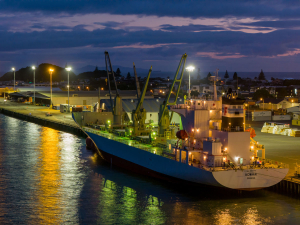Record Kiwifruit Crop 2025-26: Zespri Forecasts Highest Grower Returns
Good news for kiwifruit growers - a record crop with forecast per hectare returns at record levels for all fruit categories for the 2025-26 season.
 Zespri, in collaboration with ANL/CMA CGM, has initiated a feasibility study to investigate the potential for a low-emissions shipping corridor from Tauranga to Zeebrugge, Belgium, through the Panama Canal.
Zespri, in collaboration with ANL/CMA CGM, has initiated a feasibility study to investigate the potential for a low-emissions shipping corridor from Tauranga to Zeebrugge, Belgium, through the Panama Canal.
Zespri, in collaboration with ANL/CMA CGM, has initiated a feasibility study to investigate the potential for a low-emissions shipping corridor from Tauranga to Zeebrugge, Belgium, through the Panama Canal.
Zespri executive officer sustainability Rachel Depree says shipping plays a key role in New Zealand’s export-driven economy, carrying 99% of the country’s trade by volume and approximately 80% by value.
“Low-emissions shipping is a critical part of carbon reduction for exporters and also underpins our collective ability to achieve the government’s goal of doubling export value over the next 10 years,” Depree says.
“Collectively, we are already facing rising costs as carbon is priced into the economy and our markets and customers are starting to demand targets and plans to lower emissions over time,” she says.
Depree says shipping emissions is a key challenge to decarbonising the kiwifruit industry and meeting Zespri’s climate commitments.
“While kiwifruit is a low-carbon product, shipping emissions make up a larger portion of the product’s overall carbon footprint at 43% - and that’s why action is a priority.”
She says that, like many exporters, Zespri cannot directly reduce shipping emissions itself hence the reason why the exporter is working with its shipping and distribution partners to improve efficiency and find opportunities to pilot low-emissions fuel solutions as it works towards its aim of being carbon positive by 2035.
“This includes continuing to advocate for new port infrastructure and supporting the introduction of more low emissions shipping vessels, fuels and technology – all of which are critical and which require significant investment,” says Depree.
“The problem is significant and the answer complex but we do know success here will require coordinated action across government and supply chains,” she says.
New Zealand and Chile have signed a new arrangement designed to boost agricultural cooperation and drive sector success.
New DairyNZ research will help farmers mitigate the impacts of heat stress on herds in high-risk regions of the country.
Budou are being picked now in Bridge Pā, the most intense and exciting time of the year for the Greencollar team – and the harvest of the finest eating grapes is weeks earlier than expected.
The Real Estate Institute of New Zealand (REINZ) has released its latest rural property report, providing a detailed view of New Zealand’s rural real estate market for the 12 months ending December 2025.
Rural retailer Farmlands has released it's latest round of half-year results, labeling it as evidence that its five-year strategy is delivering on financial performance and better value for members.
OPINION: "We are back to where we were a year ago," according to a leading banking analyst in the UK, referring to US president Donald Trump's latest imposition of a global 10% tariff on all exports into the US.

OPINION: A mate of yours truly reckons rural Manawatu families are the latest to suffer under what he calls the…
OPINION: If old Winston Peters thinks building trade relations with new nations, such as India, isn't a necessary investment in…